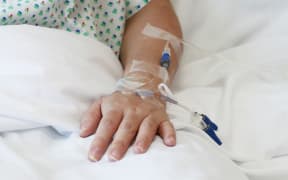Health Minister Jonathan Coleman says he is unhappy he first learnt of a typhoid outbreak from the media 10 days after public health officials were notified.

Health Minister Jonathan Coleman Photo: The Wireless: RNZ/Claire Eastham-Farrelly
There are 16 confirmed and two probable cases of the highly contagious disease in Auckland, with 12 people in hospital.
Auckland health officials were tracing more than 70 contacts, from 15 families, including up to five who handled food.
The outbreak was centred on a Samoan Assembly of God church that meets in Auckland's Mt Roskill.
A woman died in Auckland City Hospital last Tuesday after contracting the infection.
Her family said no-one told them she had typhoid when they visited her, meaning they had close contact with their sick relative.
The Auckland Regional Public Health Service said they did not know the woman had typhoid until she had died.
Dr Coleman said he took officials to task for not letting him know about the outbreak earlier. He said the Auckland public health unit needed to improve its communication.
"I've received a number of apologies. I certainly don't expect to find out about things on the TV news. They've been taken to task for it, put it that way."
He said the Auckland Regional Public Health Service (ARPHS) had learnt lessons.
"The clinical handling's been fine ... clearly the communication could have been better on a variety of levels," Dr Coleman said.
That included with the woman's family, he said, and helping them understand what was happening.
"I think some wires might have been crossed along the way."
ARPHS public health physician William Rainger conceded there were delays.
He said when a doctor or lab confirmed typhoid, they must tell the health service.
While he could not speak for hospital doctors, he understood the woman was in hospital with pneumonia. A lab test confirming she had typhoid did not arrive until she had died.
While typhoid was a serious illness, it was not easily passed from one person to another.
"Typhoid is transmitted by consuming food or water that has been contaminated by faeces or urine of an infected person. Casual contact with an infected person is very rare to result in transmission of the disease."
Once it became clear there was an outbreak amongst the church community, the health service worked with the church pastor and the woman's immediate family, which he believed was appropriate.
"The complication has been, I think, that some of the messaging or communication to the church community has been delayed because of sensitivities around the funeral arrangements ... and that has probably delayed things.
"It would have been preferable to communicate en masse to the church community earlier," Dr Rainger said.
DHB reviews care
Auckland DHB chief medical officer Dr Margaret Wilsher said she reviewed the woman's treatment.
"She was very unwell when she presented, and it was soon apparent that she had some sort of severe infection on top of pre-existing important medical problems.
"The cause of the infection, typhoid, only became apparent on blood test as she was dying.
"Even if the blood result had come back earlier, we would still have allowed the family to be present to hold and support their loved one. Because the patient didn't have diarrhoea, they were not at significant risk of infection."
Samoa not notified
Samoa's top health official said it was unusual New Zealand health authorities did not notify the country about the typhoid death.
Leausa Take Naseri said, even if the outbreak was localised, there was a risk to travelling family members.
Officials were trying to determine how many people travelled to the funeral from Samoa and whether any had returned, he said.
The Samoan health department would send out a public notice for potentially-affected people to be screened.




